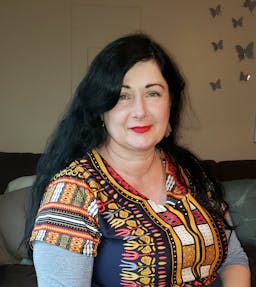Tackling Ethnic Conflict at Home
May 28, 2019
Story
Brick rips across darkened eyebrows, tearing the skin from my fallen face.
Only 25, but I know what's coming. Hatred has taken form among us, the monster that maimsand kills. It winds its way through the malicious midnight of the 3 o'clock sky as if to say it could reign if it wanted or decided to.
\"You wanna-be, you're mad cause you can't be me,\" a female voice shouts at me. I look over and see she's with several others, so I don't like my odds. Most people would say I had no business being a woman of European and Native American ancestry at an African-American club in the housing projects, but I consider myself a global citizen and therefore I go where I want.
\"Who's the wanna-be?\"I askfoolishly.\"You're the one with European wavy in your hair.\" She hits me with thebrick, I batter her verbally for the weave. Red grit cradles my temple and blood rushes into my eye. Soft butglued in bangs wrap themselves around her forehead, testifying to her supposedauthenticity. I swing back out of spite, then a slab of concrete slams into my other eye.
Both eyes swell shut and I fall down. Their feet become torpedoes, smashing, stomping, scaring and scarring me. For weeks, my body would remain covered with shoe print sized bruises. For twelve years my eyebrow would not grow back. Seventeen years later, I write to build peace.
Desegration was a good idea but the truth is that it did not bring about integration in the United States.American society is still highly segregated, especially when it comes to black and white. That's one of the lessons I learned from the attack of these women on my body and soul. Their hatred of me was real and tangible and it stemmed from a place inside their souls that has been ravaged by the legacy of slavery and racism. I have spent many years immersed in black community and have often witnessed the rage, suspicion, distrust and thirst for retribution that exists among many there toward Euro-descendants. There is no remorse in my sharing this truth, because we have reached a point in time where political correctedness is a liability.
When police are killing unarmed black people and blacks are committing hate crimes similar to those that were once done to them, it becomes imperative that wemust reverse these trends. We need tolearn how to integrate ourselves through open and honest dialogue and via peacemaking initiatives if we are to survive.
Thought we did that, you say? It's not been done, never was. One day we went to separate schools andhad separate cultures, the next day we supposedly did not. The truth is that we're still learning about and learning to trust each other, that many of us live dichotimous lives andthat we have a long, long way to go as Americans before we can genuinely be integrated.
Both blacks and whites have worn and do wear what Paul Lawrence Dunbar called \"The Mask,\" when it comes to matters of race.In a poem of the same name, Dunbar wrote that \"We wear the mask that grins and lies, it hides our cheeks and shades our eyes, this debt we pay to human guile, with torn and bleeding hearts we smile.\"
Taken in a modern context--because it is still relevant--Dunbar's poem points to many of the struggles that Afro-Descendants must deal with still to date. The mask that grins and lies could point to blaxploitation in the media via buffoonery and false gangsterism and/or the manipulation of social service offerings and donor states by the formerly colonized. Hidden cheeks and shaded eyes might represent the false modesty of success or of religious conservatism. No matter one's ethnic make-up, though, we have an obligation to consider our own and others' pathologies because that's what a caring, integrated state looks like.
Women can lead the way in these discussions, if only we realize that feminism and sisterhood themselves cannot be a reality without having the hard conversations and doing the difficult work.
What does it mean for a society if itscitizens wear smiles throughout their days that carefully cover torn and bleeding hearts? How safe can we be? How much can we trulyknow each other? How can we integrate across ethnic and racial lines if we are not able to smile genuinely at one another or to share the pain that lives inside of us?The answer is simple.
We can't.




